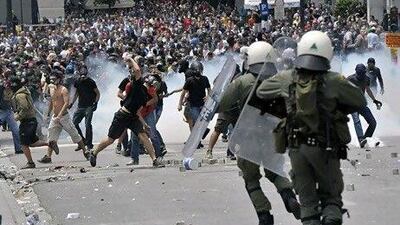At the beginning of this week, Europe's top bankers marked the end of the summer holidays and the return to work by warning of Armageddon, the sky falling on our heads, and the end of the world as we know it.
If the euro zone breaks up, "we will have a recession which makes the 1930s look like nothing", Gerrit Zalm, the chairman of ABN Amro Group, told Dutch television. "The whole of Europe will crumble."
True, there were worries that a US regulator was suing several banks over the selling of toxic mortgage debt and that disappointing employment figures indicated America was heading to a recession. But could it be this bad?
Josef Ackermann, the chief executive of Deutsche Bank and arguably Europe's most powerful banker, was equally adamant that a storm was brewing, telling a banking conference that "many banks would not survive having to revalue their sovereign debt … at market levels", and adding, "we are seeing conditions similar to 2008".
Since the beginning of the year, many of Europe's leading banks, including France's Societe Generale, Switzerland's UBS and Britain's Royal Bank of Scotland, have lost a third or more of their market value.
But what has inspired this sudden loss of confidence in the European banking sector and spooked the stock markets to such an extent that most banks' shares have fallen by about 10 per cent in the past two days?
The answer is a fierce disagreement between Europe's top bankers and their policymakers. Christine Lagarde, the new head of the IMF and France's former finance minister, warned bankers last week of the need to recapitalise. It was this that was spooking investors, combined with the vitriolic rhetoric from the financial community.
The bankers' response has been to blame politicians and ask: what is the point? If the sovereigns leave the euro and their debts suddenly double or triple because they are now in a devalued currency, the same thing would happen to the banks holding euro-denominated debt, and no amount of capital could help.
This is almost unprecedented in being an argument conducted in public. The European way is normally behind closed doors, secret deals that leak out only later. What exactly are the bankers trying to achieve here? Their point is to prove that any solution to Europe's woes lies with its politicians, not its bankers. Bankers fear regulation like a schoolboy fears a bath. They want the European Central Bank to lower interest rates, issue its own euro bonds, and either buy up or guarantee the debt of European countries. That is the only way, they argue, that confidence can be restored. If it means that their share prices are battered in the process, so be it. They will think of another way of paying themselves bonuses, perhaps in gold or oil.
In a way, the bankers are right. If Greece, Portugal or Italy are forced out of the euro zone, any bank exposed to that debt in a meaningful way will be wiped out. Because of this, banks are increasingly reluctant to lend to each other, just as happened during the credit crunch of 2008.
Europe's leaders need to decide whether they want to save the euro or not. If they do, they need to do it in a fashion so impressive that harmony and confidence are restored to the markets. All credit is a confidence trick. The word credit comes from the Latin "credo" meaning "I believe" or "I trust". At the moment, nobody trusts anybody. When bankers stop trusting each other, the world's economy freezes.
Banks have been selling bonds secured against their lending, but they also need to tap the unsecured bond markets, something that has been effectively closed since early July. Last month, the cost of insuring European banks' debt against default hit a record. Even if a bank manages to sell bonds, it would have to pay almost twice as much as similarly rated companies in other sectors pay to sell bonds.
According to Morgan Stanley, the biggest banks have already completed up to 90 per cent of their borrowing needs for this year. Perhaps this is another reason that they are willing to be so outspoken.
But whether or not the euro survives should not shield bankers from having to endure greater scrutiny and regulation, and perhaps higher mandatory capital requirements. For too long bankers have used their institutions as private piggy banks that they empty at will, relying on politicians to refill them when they run dry.
There is neither the appetite nor the money for further bank bailouts. But if the politicians want to keep the euro, they need to make big calls, not mess about with minor issues such as capital adequacy ratios. Tanking stock markets are bound to help them focus.
It may be tempting for investors in the Gulf to watch the events in Europe and thank their lucky stars that they are not involved in or exposed to the fallout. That would be a mistake. If this row rumbles on and is not resolved soon, it will make the fallout from Lehman Brothers look like a small provincial bankruptcy.

